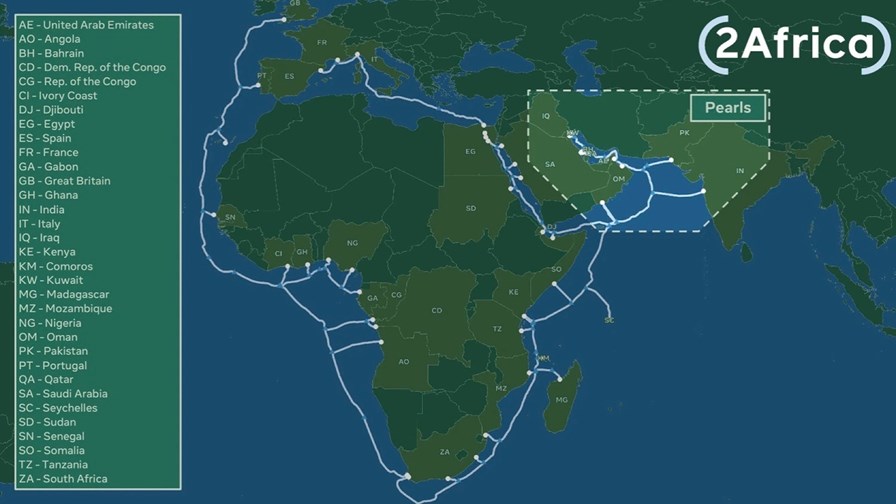
- 2Africa subsea cable extends to Middle East, Asia
- NTT’s sustainability efforts include sale of ‘green’ energy by DOCOMO
- Facebook eyes up the metaverse
The ongoing expansion and development of the world’s largest subsea cable and NTT’s sustainability plans lead the way in today’s news roundup.
The 2Africa subsea cable that already connects Africa and Europe is being extended to the Middle East and Asia via an extension called 2Africa Pearls that will have landing stations in Oman, UAE, Qatar, Bahrain, Kuwait, Iraq, Pakistan, India, and Saudi Arabia. The extension will bring additional international data connectivity to nations with aggregate populations of about 1.8 billion, taking the total reached by 2Africa’s network to about 3 billion, and take the total length of the cable to more than 45,000 kilometres, making it the world’s longest. To find out more, see this announcement from Facebook, one of the cable’s consortium partners along with China Mobile International, MTN GlobalConnect, Orange, stc, Telecom Egypt, Vodafone and WIOCC.
NTT might take the prize for most underhyped sustainability goal. The Japanese giant’s environmental energy vision "NTT Green Innovation Toward 2040" aims to simultaneously achieve zero environmental impact and economic growth by "Reduction of Environmental Impact through Business Activities" and "Creation of Breakthrough Innovation". Obviously the pizzaz is somewhat lost in translation, but if you think this goal is modest when compared to other telcos (at least one of whom is actually talking about going carbon negative soon) then bear in mind that it sounds like a step up from the Japanese government’s own goal which involves aiming to “substantially reduce” greenhouse gas emissions to zero by 2050: a fairly spongy target, more like an aspiration.
And that’s not all... The Japanese operator’s national mobile business, NTT DOCOMO, is not only working towards its own green targets, but also plans to start selling “electricity generated from renewable sources as ‘docomo Denki Green’ in the retail market directly to customers from March 2022 in its ‘docomo Denki’ electricity service lineup. In collaboration with partner companies, the company will also consider delivering environmentally-friendly products and services, and in conjunction with our customers who will use these products and services, will promote carbon neutrality for the benefit of the whole of society.” Read more.
Just what it needed… BT is bracing itself for a class action on behalf of 2.5 million BT customers who, it’s claimed, could each be due to £500 compensation for historical overcharging. According to the Guardian newspaper the competition appeal tribunal (CAT) has allowed Justin Le Patourel, the founder of consumer group Collective Action on Landlines (Call), and a previous employee of regulator Ofcom, to bring the landmark £600m case on behalf of 2.3 million landline-only customers against BT. The group claims the customers, typically from older and low-income households, are owed compensation for payments made between October 2015 and April 2018. Naturally BT “strongly disagrees” with what it describes as a “speculative claim” and says it will consider all available options for its fightback.
Facebook is getting in on the ‘metaverse’ action with the creation of the XR Programs and Research Fund, “a two-year $50 million investment in programs and external research” focused on the development of “a set of virtual spaces where you can create and explore with other people who aren’t in the same physical space as you.” In this announcement, Facebook says that “through this fund, we’ll collaborate with industry partners, civil rights groups, governments, nonprofits and academic institutions to determine how to build these technologies responsibly.” Given the social media giant’s track record, that’s not very convincing...
Qualcomm has followed up on the year ago launch of its IoT Services Suite with over 30 specific IoT as-a-Service (IoTaaS) applications for popular verticals launched yesterday. The company says its IoTaaS model is designed to remove the need for user companies to invest in costly and fragmented efforts and claims it enables streamlined, end-to-end solutions taking the place of lengthy processes that previously took months or years, thus supporting rollout with faster time to commercialisation. It has unveiled more than 30 IoTaaS vertical applications including ‘Inspection as-a-Service’ to detect incidents on construction sites; Smart Asset Management as-a-Service for supply chain visibility; ‘Traffic Management as-a-Service’ and many more. You can get more information on its range of IoTaaS applications here.
At MWC Africa, the GSMA launched its global State of Mobile Internet Connectivity Report 2021 showing that, despite the COVID-19 pandemic, more than half of the world’s population is now using the mobile internet. Mobile internet usage translates to just over 4 billion connected people, 225 million more compared to 2019, and up from a third of people globally just six years ago. But before we all do a ‘woop woop’ chorus understand that of the 3.8 billion people who remain unconnected, only 450 million of them DON’T live in areas with mobile broadband coverage - so 3.4 billion people live in areas that are already covered by mobile broadband, but are not using it! The problem is the cost of broadband-capable smartphones and the cost of services. See - Making those final few billion connections
CityFibre, the UK’s largest alternative provider of wholesale fibre infrastructure, has significantly extended and expanded its partnership with engineering and construction group, Bechtel, to support its growing rollout to approximately one third of the UK market by 2025. It currently manages 25 network construction partners and more than 60 parallel full town and city builds. Read more…
Samsung says it’s demonstrated improved Wi-Fi service in a fast-moving subway train using its 5G mmWave solution as a backhaul in Seoul, Korea. Samsung reached Wi-Fi downlink speeds of 1.8Gbps using a Samsung Galaxy S21 Ultra on a moving subway train in the trial. That data speed is 25 times faster than the current average speed of 71Mbps on Seoul’s subway lines. Read more...
Email Newsletters
Sign up to receive TelecomTV's top news and videos, plus exclusive subscriber-only content direct to your inbox.




